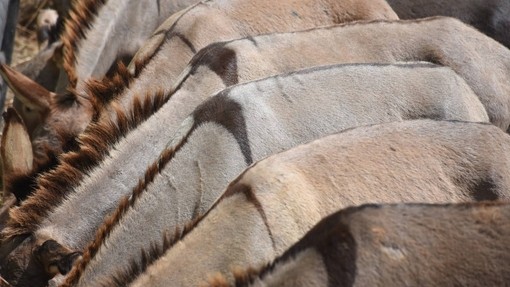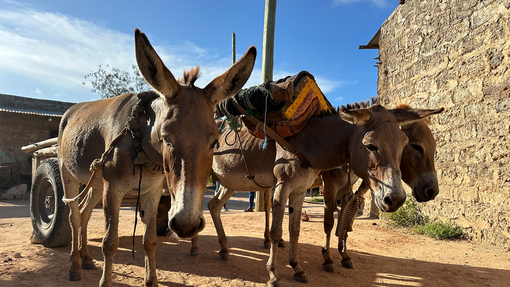Emirates implement a ban
Millions of donkeys are killed for their skins each year, which are exported across the world and used to make traditional medicine and remedies. The move by the world’s largest international airline serves to disrupt the donkey skin trade by restricting the international movement of hides, protecting donkey populations and the communities that rely on donkeys for their livelihoods.
In February this year, African Heads of State and Government endorsed a continent-wide moratorium on the slaughter of donkeys for their skins at the 37th African Union Summit. The agreement was made in recognition of animal welfare concerns and the vital role donkeys play in supporting communities and economies across Africa.
Within days of the decision from the African Union, Emirates extended their zero-tolerance policy on the carriage of banned species, hunting trophies and other associated products, to cover donkey hides and parts.To enforce its policy against wildlife trafficking, Emirates has established stringent protocols including screenings, spot checks, document verification, container examination, and confirming the authenticity of permits.
The airline has also invested in awareness campaigns, as well as education and training for employees across cargo and passenger operations to identify and report smuggled wildlife.
Joint research by The Donkey Sanctuary and the University of Oxford’s Saïd Business School and Wildlife Conservation Research Unit (WildCRU) uncovered significant evidence linking the movement of donkey skins with other illegal wildlife trafficking and organised crime. Robust policies and screening measures ensure that only approved cargo is carried, ultimately halting illegal trafficking and other illicit trade in its tracks.
Marianne Steele, CEO of The Donkey Sanctuary, said: “This is a cruel and unsustainable trade which acts as a trojan horse for illegal wildlife trafficking and organised crime, and poses a serious threat to global biosecurity.
“Emirates and other leaders in the transport sector should be commended for their decisive and market-leading action which will not only protect donkeys and the communities around the world who rely on them, but will also help prevent the trafficking of other threatened species and reduce the risk of disease being passed from donkey skins to humans.
“We hope that by taking leadership on this important global issue and banning the carriage of donkey skins on Emirates flights, they will inspire others to do the same.”
Robert Fordree, Senior Vice President of Cargo Operations Worldwide, Emirates SkyCargo said: “We are proud global leaders in the fight against the trafficking and illegal exploitation of wildlife. This longstanding commitment enabled us to mobilise immediately to ban the carriage of donkey skins under our existing zero-tolerance policy. We will continue to collaborate with organisations such as The Donkey Sanctuary and United for Wildlife to protect the world’s biodiversity for generations to come.”
As the backbone of global trade, the land, air and sea logistics network is exploited by the wildlife black market to smuggle animals or animal products from source to destination, often across international borders.
While many airlines, shippers and transport and logistics operators have strict policies that prevent the movement of trafficked wildlife, it is hoped that others will follow Emirates’ lead and expand these to specifically cover donkey skins, following the landmark decision by the African Union.
Share this page
Tags
- News





